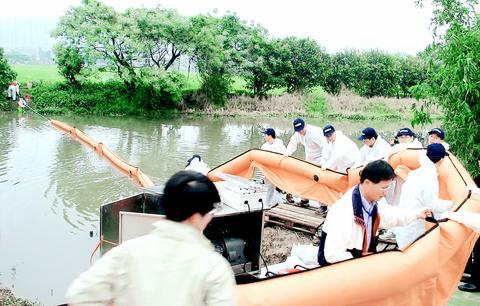The Environmental Protection Administration (EPA) announced that it was ready to start using locally-developed techniques and equipment to clean up oil spills in rivers.
The EPA yesterday held a practice run in a section of Tamsui River near the Peitou Waste Incinerator in Taipei. The standard operating procedure for handling oil spills in rivers was demonstrated to dozens of environmental officials from 22 counties.

PHOTO: CHIU YU-TZU, TAIPEI TIMES
Operators use automatic pumps to fill plastic tubes with gas. The tubes float on the river's surface and prevent the oil spill from spreading.
A remote-controlled aircraft, developed by scientists at National Central University, was used to approach the target area. It will be used to gather more information about oil spills in relatively inaccessible areas.
Samples of polluted water will be taken by a remote-controlled boat with Global Positioning System (GPS) capabilities.
Officials said that yesterday's trial run was triggered by a series of oil spills over the last two months.
A tonne of heavy oil leaked from a textile factory in Changhua County last month, affecting coastal areas where oysters are farmed. Earlier this month, in Kaohsiung County, 3.5 tonnes of heavy oil was spilled from a papermaking factory. A nearby canal was filled with about 1.5 tonnes of oil.
According to Cheng Shean-rong (
Cheng said that the oil spill from the Greek-registered cargo ship Amorgos in January, 2000, which caused a spill of 1,150 tonnes of fuel oil that ended up in the Kenting National Park, had prompted the EPA to make a serious financial and human resources investment in inventing technologies and establishing a standard operating procedure to prevent water pollution.
"All related facilities and instruments are in place in northern, central and southern Taiwan. They will be available immediately in case of an oil spill," Cheng said.
The EPA budgets about NT$60 million annually to improve its ability to handle oil spills.
EPA head Chang Juu-en (

ALIGNED THINKING: Taiwan and Japan have a mutual interest in trade, culture and engineering, and can work together for stability, Cho Jung-tai said Taiwan and Japan are two like-minded countries willing to work together to form a “safety barrier” in the Indo-Pacific region, Premier Cho Jung-tai (卓榮泰) yesterday said at the opening ceremony of the 35th Taiwan-Japan Modern Engineering and Technology Symposium in Taipei. Taiwan and Japan are close geographically and closer emotionally, he added. Citing the overflowing of a barrier lake in the Mataian River (馬太鞍溪) in September, Cho said the submersible water level sensors given by Japan during the disaster helped Taiwan monitor the lake’s water levels more accurately. Japan also provided a lot of vaccines early in the outbreak of the COVID-19 pandemic,

Kaohsiung Mayor Chen Chi-mai (陳其邁) on Monday announced light shows and themed traffic lights to welcome fans of South Korean pop group Twice to the port city. The group is to play Kaohsiung on Saturday as part of its “This Is For” world tour. It would be the group’s first performance in Taiwan since its debut 10 years ago. The all-female group consists of five South Koreans, three Japanese and Tainan’s Chou Tzu-yu (周子瑜), the first Taiwan-born and raised member of a South Korean girl group. To promote the group’s arrival, the city has been holding a series of events, including a pop-up

TEMPORAL/SPIRITUAL: Beijing’s claim that the next Buddhist leader must come from China is a heavy-handed political maneuver that will fall flat-faced, experts said China’s requirement that the Dalai Lama’s reincarnation to be born in China and approved by Beijing has drawn criticism, with experts at a forum in Taipei yesterday saying that if Beijing were to put forth its own Dalai Lama, the person would not be recognized by the Tibetan Buddhist community. The experts made a remarks at the two-day forum hosted by the Tibet Religious Foundation of His Holiness the Dalai Lama titled: “The Snow Land Forum: Finding Common Ground on Tibet.” China says it has the right to determine the Dalai Lama’s reincarnation, as it claims sovereignty over Tibet since ancient times,

Temperatures in some parts of Taiwan are expected to fall sharply to lows of 15°C later this week as seasonal northeasterly winds strengthen, the Central Weather Administration (CWA) said today. It is to be the strongest cold wave to affect northern Taiwan this autumn, while Chiayi County in the southwest and some parts of central Taiwan are likely to also see lower temperatures due to radiational cooling, which occurs under conditions of clear skies, light winds and dry weather, the CWA said. Across Taiwan, temperatures are to fall gradually this week, dropping to 15°C to 16°C in the early hours of Wednesday